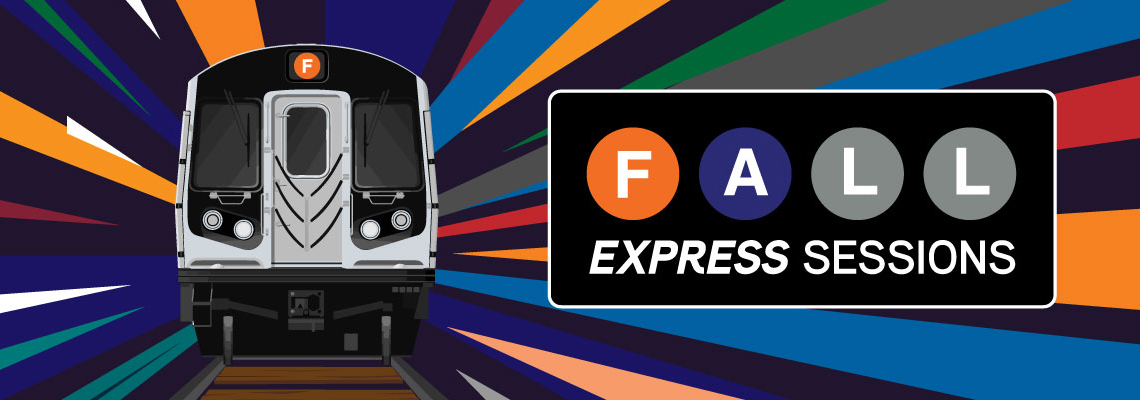
Start fall your way!
BMCC is offering two express sessions to allow for more flexibility in learning this fall.
Contact the Academic Advisement & Transfer Center at aatc@bmcc.cuny.edu to speak with an advisor about your fall express courses.
Frequently Asked Questions
1. Why are we offering fall express sessions?
BMCC’s fall express sessions allow greater flexibility to students in terms of taking courses in shorter time frames. This is similar to the summer sessions.
2. What sessions will be offered for fall 2024?
- 15-Week Regular Session (Regular Academic Session: 8/28/2024–12/21/2024) – This is our normal term length and there will be a majority of course offerings will be available.
- 7-Week Express Session (Seven Week–First Session: 9/3/2024–10/22/2024) – To offer flexibility, there will be limited course offerings in this express session.
- 8-Week Express Session (Eight Week-Second Session: 10/24/2024–12/21/2024) – To offer flexibility, there will be limited course offerings in this express session.
3. Who can enroll in fall express sessions?
All students are welcome to enroll in the fall express sessions, but it is ideal for part-time students who desire shorter sessions or new and continuing students who miss registration for the 15-week session before classes begin. Please note that there will be limited course offerings and some financial aid limitations, students are highly encouraged to speak with an advisor to see if the express sessions are the best option for them.
4. How do I register for these classes?
Fall express sessions will be available for enrollment starting in August 2024. Students must be advised before registering. Students can register on CUNYfirst via Schedule Builder. Before confirming registration on CUNYfirst, students should double-check course starting dates to make they are registering for the correct session.
5. What type of courses will be offered?
Fall express sessions offer high demand entry-level courses from various academic areas. Students can view available course options online via CUNY Global Search and filter by Session (Seven Week—First or Eight Week—Second) or on Schedule Builder.
6. How many credits can students take?
In each Fall express session students can take a maximum of 9 credits/hours, but for all sessions combined total cannot exceed 18 credits/hours. Students on academic notice will be restricted to a maximum of 14 credits. Students who have a 3.5+ cumulative GPA can request an additional 3 credits/hours by emailing the Registrar’s Office at registrar@bmcc.cuny.edu.
7. What if a student has a W for a course taken in 15-week or 7-week session. Can they retake the course in 8-week session?
Yes, a student can retake the course in 8-week session, but the student must contact the Registrar’s Office via email at registrar@bmcc.cuny.edu as the student will need to be enrolled manually.
8. When will students be able to register for fall express sessions?
Students will be able to register for Fall express sessions starting August 19, 2024.
9. What does this mean for my financial aid if I take credits in multiple terms in the fall semester?
BMCC’s fall 7-week and 8-week sessions are considered part of the fall term. Students may be eligible to receive PELL and/or TAP for attending the fall express sessions.
Please note that if a student enrolls in both the 15-week/7-week sessions and the 8-week session, registration for all sessions must occur by September 2 and the student’s financial aid eligibility will be based on enrollment as of September 2. If additional courses are added for the 8-week session after August 31, those course(s) cannot be used to determine the student’s financial aid eligibility. However, if a student enrolls only for the 8-week session without enrolling in the 15-week/7-week session by October 26, then the student will be eligible for financial aid for all courses in the 8-week session. Students who have questions about their financial aid eligibility should speak to their advisor.
Please see examples below:
Scenario 1: John registers for 9 credits in the 15-week session by September 2 and adds a 3-credit course on September 3 for the fall 7-week or fall 8-week session. John will be eligible for ¾ Pell based on 9 credits enrollment in the 15-week session even though the student’s academic load for the term will be full-time.
Scenario 2: Linda registers for 9 credits in the 8-week session by October 26 with no enrollment for the 15-week or 7-week session. Linda will be eligible for ¾ Pell based on 9 credits enrollment only in the 8-week express session.
10. Will students enrolling in the express sessions be eligible for TAP?
Yes, but in order to be eligible for TAP, students must register full-time for all sessions by September 17, 2024. Apart from registering by the deadline, students must register for at least one course in the regular section running the entire semester.
11. What is the refund policy for the express sessions?
For fall express sessions, there will be an adjusted refund schedule. Instead of the traditional 75%, 50%, and 25% refund periods, there will be only one refund period where students can get 100% of their tuition back until a few days after classes begin for the session. Check the official Academic Calendar for more details.

